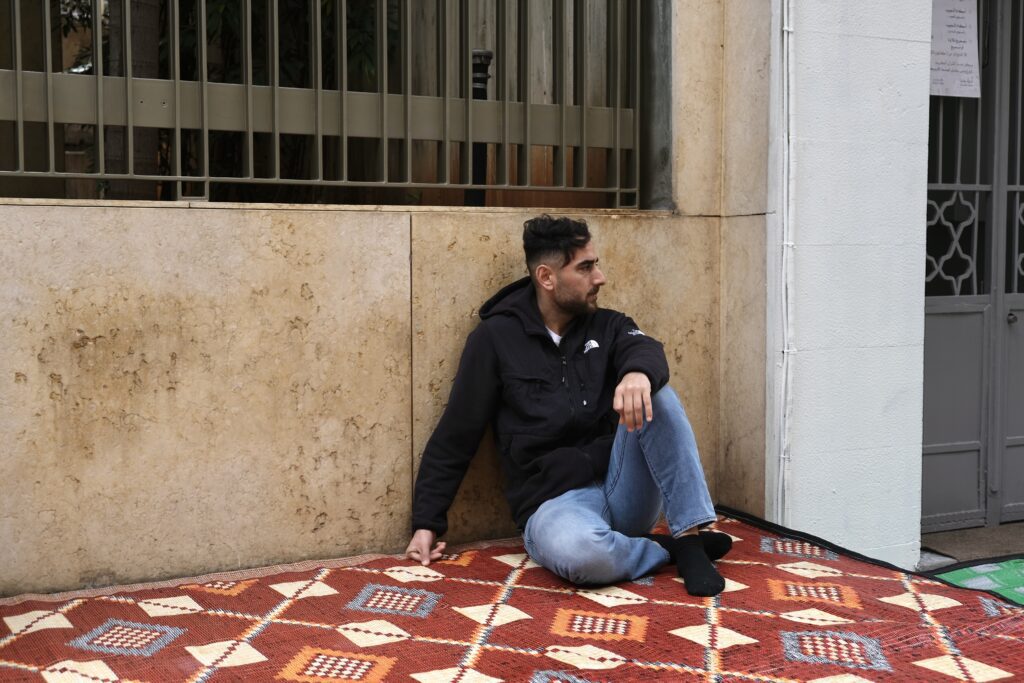Ramadan spreads its sacred aura throughout Lebanon – Muslims unite across the nation to observe this revered month of fasting, prayer, and self-reflection. As dusk descends, families, friends, and neighbors converge around tables laden with delectable dishes.
They eagerly anticipate the moment to break their fast together. Laughter, conversation, and the aroma of favorite meals infuse the air. Amidst the spiritual fervor, the cherished company of loved ones remains central to the celebrations. But not everyone in Lebanon finds solace in Ramadan’s embrace.
For some individuals, like Mohamed Hussain Simave, a refugee from Syria, it’s the loneliest time of the year.
“I feel worse during Ramadan. It’s not the same anymore without the atmosphere with my family,” Mohamed confides.
Mohamed isn’t the only one grappling with the difficulties of traditional gatherings during Ramadan. Lebanon stands out for hosting the largest number of refugees per capita globally – one out of every eight refugees resides within its borders.
According to the UN Refugee Agency, Lebanon is home to approximately 1.5 million Syrian refugees and 210,000 Palestinian refugees, both from predominantly Muslim countries. While many refugees live with their families in Lebanon, others have had to build new lives independently. As a result, many of these Muslim individuals observe Ramadan alone each year.
But what is it like to experience the most sacred month of the year without loved ones nearby?
Mohamed Hussain Simave takes us on a journey through his two stages of Ramadan: 18 years steeped in the familial warmth of Syria, and 12 solitary years navigating Ramadan’s depths in Lebanon.
Nostalgia for family gathering
Mohamed, born in Aleppo, Syria in 1994, fondly recalls the cherished days of Ramadan in Syria during his childhood.
“It was the most beautiful time of my life,” he remembers.
When the conversation turns to Syria, Mohamed’s face lights up with a radiant smile, as if transported to a place of cherished memories.
When Mohamed Hussain Simave left Syria in 2012, he didn’t take anything, hoping to return soon. However, his family’s house, along with its memories and photos, was destroyed. Mohamed has only been able to find a single picture from his time in Syria, which brings back beautiful memories of his village in Aleppo.
In his village, everyone was familiar with one another. Mohamed would often join fellow villagers for pre-Iftar football matches during Ramadan. His family shared their culinary delights with neighbors and relatives, exchanging dishes before breaking their fast. This tradition added delightful diversity to their dining table.
Mohamed fondly recalls the daily Iftar with his entire family, where ten or twenty of them would gather around the table. Their meals were elaborate, featuring a hearty main course, appetizers, three varieties of soup, and refreshing juices, with licorice juice being a particular favorite during Ramadan.
After Iftar, they would bow their heads in prayer, often in the comfort of their own home. Then, they would unwind with post-meal rituals, whether it be sharing stories over a cup of coffee or watching captivating soap operas together.
The lively gatherings often stretched into the late hours, lingering with laughter and connection until well past midnight.
Nothing quite compares to Syria – the cuisine, the ambiance, everything holds a unique charm for Mohamed. Ramadan in Syria is a world apart because, for him, the essence of Ramadan was always centered around family. While the holy month in Lebanon is merely a shadow without its essence.
Breaking fast with a heavy heart
When the war engulfed Syria in 2011, Mohamed had no choice but to leave his homeland. Alone, he sought refuge in Beirut, Lebanon. It has been 12 long years since then, and he hasn’t laid eyes on any of his five brothers, four sisters, or his parents.
The tumult of the Syrian war forced the family to scatter across the region, leaving Mohamed yearning for the warmth of their embrace over the past 12 Ramadan celebrations.
In the outskirts of Beirut, nestled in Antelias, Mohamed’s dwelling stands. Yet, he rarely finds the chance to return home for dinner due to work commitments, even during the sacred month of Ramadan.
With little time for leisurely activities like watching TV or socializing with friends due to his limited social circle, he often ends up at his laundry store in Hamra. There, he shares meals with his employees.
Sometimes, he manages to slip home briefly to prepare dates, soups, juice, and a simple meal. During these moments, the absence of familial camaraderie weighs heavily on him. Nonetheless, as the call to prayer resonates through the air, he resigns himself to reality and begins his meal.
“I never eat with a big appetite because of all the memories that come flooding back with my family during Iftar time in Syria,” Mohamed shares.
The meals lack the variety and flavor that characterized Iftars back home, leaving Mohamed longing for the familiar tastes of his village.
Despite the physical distance, Mohamed still stays connected with his family through video calls during Iftar. He eagerly shares details of his day and relishes the brief moments of connection. These conversations serve as a lifeline, offering a semblance of the familial bond.
As Mohamed reflects on Ramadan as a blend of family warmth and gatherings, he also recognizes the essence of empathy, self-discipline, and spiritual connection.
Ramadan has become a journey of self-improvement for Mohamed, with prayer serving as his guiding light. Activities like reading the Quran and attending mosque prayers bring him joy.
Despite being separated from his family for 12 years, he finds solace in God. Finally, with a clear sense of purpose, Mohamed discovers contentment.
